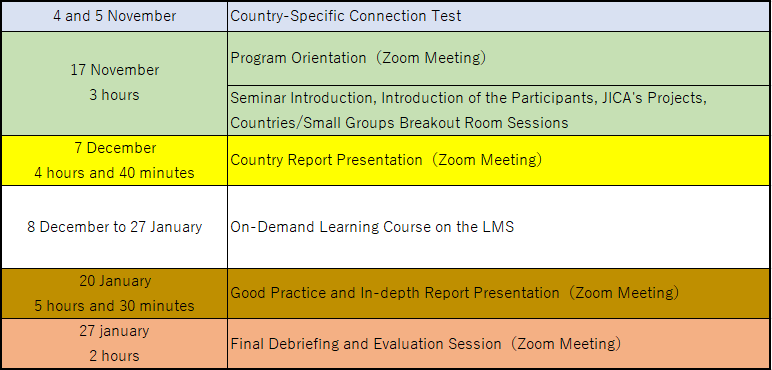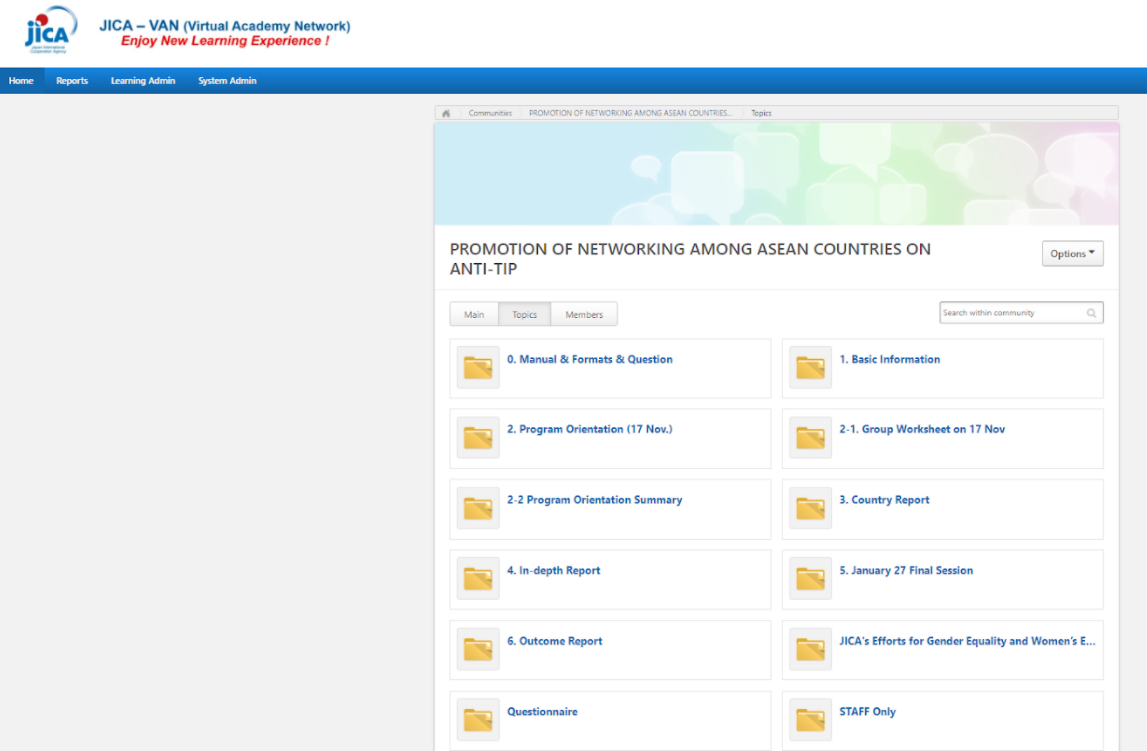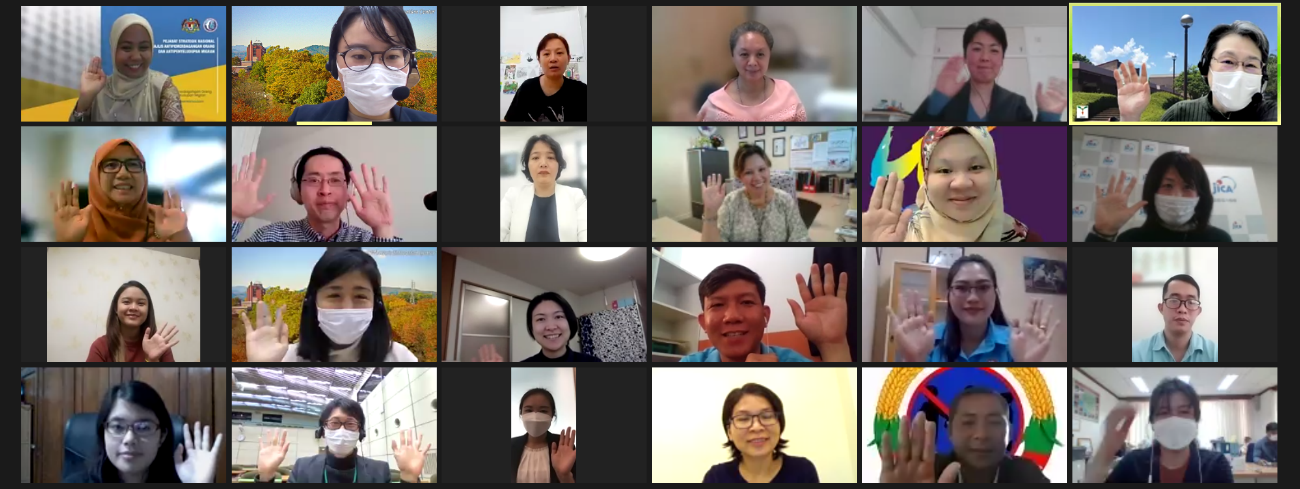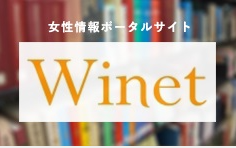Cooperation with JICA
- HOME
- International Cooperation
- Cooperation with JICA
- FY2021 Knowledge Co-creation Program "Promotion of Networking among ASEAN Countries on Anti-Trafficking in Persons”
Cooperation with JICA
- Event Report
-
FY2021 Knowledge Co-creation Program "Promotion of Networking among ASEAN Countries on Anti-Trafficking in Persons”
Date:November 4, 5 and 17, December 17, 2021 / January 20 and 27, 2022
The National Women’s Education Center (NWEC) offered a training seminar entitled “Promotion of Networking among ASEAN Countries on Anti-Trafficking in Persons” during the period from November 4, 2021 to January 27, 2022, as a project commissioned by the Japan International Cooperation Agency (JICA).
This year again, from a standpoint of preventing the spread of the coronavirus, the seminar was held online. Thirteen officers and individuals working in the area of prevention, protection, and social rehabilitation of human trafficking victims in six ASEAN countries (Cambodia, Laos, Malaysia, the Philippines, Thailand, and Vietnam) participated in the seminar.

The purpose of this seminar is to mutually learn from one another about efforts being made for anti-trafficking measures, and to get a better picture of the roles and frameworks of cooperation among relevant organizations engaging in prevention, protection, and various support for the victims. It also aims to promote discussion among the seminar participants about policies that contribute to the enhancement of the functions of organizations working on anti-trafficking measures, as well as promote cooperation and cross-border networking.
The seminar consisted of a Connection Test (November 4 and 5), a Live Orientation (November 17), a Country Report Presentation (December 7), an In-Depth Report Session (January 20), and a Final Debriefing and Evaluation Session (January 27). Although the participants had to attend the online seminar in addition to carrying out their everyday tasks, they engaged in lively discussions about the protection of victims, vocational training systems, the impact of the COVID-19 pandemic on women, legal issues, and so on.

November 17 (Wed): Orientation
The online orientation over Zoom, hosted from an NWEC conference room, connected 13 seminar participants in six countries.
Because of the time differences, the event started at 11:00 a.m. in Japan, but 9:00 a.m. in Cambodia, Thailand, Vietnam, and Laos, and 10:00 a.m. in the Philippines and Malaysia. The orientation began with self-introductions and an introduction of JICA programs, followed by briefings on the schedule of the three-month-long seminar, the use of the learning management system (LMS), and the online assignments. Then, the participants were divided into countries/small groups, and conducted separate sessions using the breakout feature on Zoom.
 Learning Management System (LMS) screen
Learning Management System (LMS) screen
December 7 (Tue): Country Report Presentation
The Country Report Presentation consisted of two parts: “Part 1: Basic information including policies and frameworks of each country regarding trafficking in persons” and “Part 2: Impact of COVID-19 on the issues of trafficking in persons in each country.” The participants presented reports using the materials they prepared in advance. Many questions were asked regarding organizations that identify victims and procedures needed for identification, support for young victims and children, language barriers between different ethnic groups and support for victims of foreign nationals, and so on.
December 8 (Wed) to January 27 (Thu): On-Demand Learning Course
A video entitled “JICA’s Effort for Gender Equality and Women’s Empowerment” was uploaded on LMS. The seminar participants learned, at their convenience, about efforts JICA is making towards improving gender equality and women’s empowerment, as well as anti-trafficking projects they are implementing in three Mekong nations (Thailand, Myanmar, and Vietnam).
 On-demand video provided by JICA Office for Gender Equality and Poverty Reduction
On-demand video provided by JICA Office for Gender Equality and Poverty Reduction
January 20 (Thu): Good Practice and In-Depth Report Presentations
Each country chose a theme to deliver presentation in the Good Practice and In-Depth Report Presentations. Guest speakers were invited from the Cambodian Women’s Crisis Center (CWCC) and the Division of Anti-Trafficking in Persons (DATIP) of the Ministry of Social Development and Human Security of Thailand, both of which are counterparts of JICA. Participants from Malaysia and the Philippines also invited guest speakers from Global Shepherds and the Batis Center for Women. The participants shared information about hardships and challenges caused by trafficking in persons, which are obscured by the COVID-19 pandemic, especially problems migrant women are facing. The participants also engaged in lively discussions on legal issues, how to offer effective vocational training and consultation, and good examples of cooperation between governments and citizen sectors.
In addition to the guest speakers and the staff from JICA regional offices, staff from ASEAN welfare-related training center, which is a counterpart of JICA, sat in on the Good Practice and In-Depth Report Presentations. The participants used the chat feature of Zoom to engage in a lively exchange of views.
January 27 (Thu): Final Debriefing and Evaluation Session
In the Final Debriefing and Evaluation Session, the outcome report (KCCP Final Report), which constitutes the deliverables of this seminar, was confirmed.
This report was comprised of a list of participants, the agenda, country reports, and excerpts from In-Depth reports. For the purpose of gauging the level of learning and the ability to apply knowledge gained from the seminar, each participant made a short presentation on how they intend to apply what they learned from the seminar to their future work. Requests were made for “more time for presentations and discussions” which shall be reflected in program designs for future years.
Trafficking in persons is a serious crime committed across borders, and many participants mentioned a growing demand for a further strengthening of networking. Results obtained from this seminar shall be utilized in future anti-trafficking projects JICA plans to conduct in the ASEAN region.
 Commemorative photograph (seminar participants, JICA and NWEC staff)
Commemorative photograph (seminar participants, JICA and NWEC staff)
Lastly, we sincerely thank all the people who offered a great deal of cooperation in carrying out this online seminar.
International Cooperation
- International Seminar
- FY2019 Seminar for Gender Equality Officers and Women Leaders in the Asia Region
- FY2018 Seminar for Gender Equality Officers and Women Leaders in the Asia Region
- FY2017 Seminar for Gender Equality Officers and Women Leaders in the Asia Region
- FY2016 Seminar for Gender Equality Officers and Women Leaders in the Asia Region
- FY2015 Seminar for Gender Equality Officers and Women Leaders in the Asia Pacific Region
- FY2014 Seminar for Gender Equality Officers and Women Leaders in the Asia Pacific Region
- FY2013 Seminar for Gender Equality Officers and Women Leaders in the Asia Pacific Region
- FY2012 Seminar for Gender Equality Officers and Women Leaders in the Asia Pacific Region
- FY2011 Seminar for Gender Equality Officer and Women Leaders in the Asia Pacific Region
- FY2010 Empowerment Seminar for Women Leaders in the Asia Pacific Region
- FY2009 Empowerment Seminar for Women Leaders in the Asia Pacific Region Final Report
- FY2008 Empowerment Seminar for Women Leaders in the Asia Pacific Region
- FY2007 Empowerment Seminar for Women Leaders in the Asia Pacific Region
- FY2006 Empowerment Seminar for Women Leaders in the Asia Pacific Region
- NWEC Global Seminar
- FY2025 NWEC Global Seminar: Addressing Technology-Facilitated Gender Based Violence (TFGBV): Approaches to Eradicate the Invisible Harm
- FY2024 NWEC Global Seminar: Gender Equality and Care
- FY2023 NWEC Global Seminar: Gender Mainstreaming & Strengthening Institutional Mechanism with Gender Perspective
- FY2022 NWEC Global Seminar: Does Digital Technology Advance Gender Equality?
- FY2021 NWEC Global Seminar: Combating Gender-Based Violence – “Building Back Better” from the Covid-19 Crisis
- FY2020 NWEC Global Seminar: Covid-19 and Gender
- FY2019 NWEC Global Seminar: Gender and Media
- FY2018 NWEC Global Seminar: Promotion of the Advancement of Women - What Japan can learn from Iceland about Gender Equality?
- FY2017 NWEC Global Seminar: Promotion for Advancement of Women Lessons from Germany
- FY2016 NWEC Global Seminar: Promotion for Advancement of Women –Lessons from Europe
- FY2015 International Symposium: Gender Equality and Women's Empowerment
- FY2014 International Symposium: Keys to Diversity and Women's Leadership
- FY2013 NWEC International Symposium:Gender Equality for Men
- FY2012 NWEC International Symposium:To Make a Society without Violence against Women a Reality
- FY2011 NWEC International Symposium
- FY2010 International Forum for Women's Empowerment
- FY2009 International Forum for Women's Empowerment
- FY2008 International Forum for Women's Empowerment Final Report3
- FY2008 International Forum for Women's Empowerment Final Report2
- FY2008 International Forum for Women's Empowerment Final Report1
- Cooperation with JICA
- FY2025 Knowledge Co-Creation Program (KCCP): "Promotion of Global Networking on Anti-Trafficking in Persons"
- FY2025 Knowledge Co-Creation Program "Eradicating Sexual and Gender-Based Violence (SGBV)"
- FY2025 Knowledge Co-Creation Program: Bangladesh “Strengthening Capacity to Address Gender-Based Violence"
- FY2024 Knowledge Co-Creation Program on "Promotion of Global Networking on Anti-Trafficking in Persons"
- FY2024 Knowledge Co-Creation Program "Eradicating Sexual and Gender-Based Violence (SGBV)"
- FY2023 Knowledge Co-creation Program "Promotion of Networking among ASEAN Countries on Anti-Trafficking in Persons”
- FY2023 Knowledge Co-Creation Program "Eradicating Sexual and Gender-Based Violence (SGBV)"
- FY2022 Knowledge Co-creation Program "Promotion of Networking among ASEAN Countries on Anti-Trafficking in Persons”
- FY2022 Knowledge Co-Creation Program "Eradicating Sexual and Gender-Based Violence (SGBV)"
- FY2021 Knowledge Co-creation Program "Promotion of Networking among ASEAN Countries on Anti-Trafficking in Persons”
- FY2020 Knowledge Co-creation Program "Promotion of Networking among ASEAN Countries on Anti-Trafficking in Persons”
- FY2019 Knowledge Co-creation Program "Promotion of Networking among ASEAN Countries on Anti-Trafficking in Persons”
- FY2018 Knowledge Co-creation Program "Promotion of Networking among ASEAN Countries on Anti-Trafficking in Persons”
- Issue-specific Training “Seminar on Promotiom of Networking among ASEAN Countries on Anti-Trafficking in Persons”
- Basic Information-Gathering Survey/Workshop Seminar on the Economic Independence for Women in Central America and the Caribbean (El Salvador/Dominican Republic)
- Regional Gender Seminar in Central and South America
- 2015 Issue-specific Training "Seminar on Promotion of Networking among Asian Countries on Anti-Trafficking in Persons"
- Seminar on the Promotion of Education for Girls and Women II
- International Conference/International Exchange
- Visit by Professor Hilado from the University of the Philippines Visayas
- Online meeting with Seisen International School elementary students
- Visitor: Mansfield Fellows
- Visitor:JICA Knowledge Co-Creation Program (KCCP) on "Women's Empowerment through Business for Central American Integration System (SICA) Member Countries"
- The 68th Session of the Commission on the Status of Women
- Visitor: Madam Sustjie Mbumba, First Lady of the Republic of Namibia
- Workshop of commemorating the donation of the Beate Shirota Gordon archive materials
- Meeting with Korean Women’s Development Institute (KWDI)
- The Coalition of Finnish Women's Associations (NYTKIS) Secretary General Ms. KAKKOLA’s Courtesy Call to Foreign Minister KAMIKAWA
- The Coalition of Finnish Women's Associations (NYTKIS) Secretary General Ms. KAKKOLA’s Japan Visit Program
- The 67th Session of the Commission on the Status of Women
- NGO CSW67 Forum
- Webinar with Korean Women’s Development Institute (KWDI)
- The 66th Session of the Commission on the Status of Women (Hybrid format)
- Online meeting with international graduate students from the Appropriate Technology course at the University of Tsukuba
- The 65th session of the Commission on the Status of Women
- Lecture "The Beate Sirota Gordon Archives at Mills College"
- Participation in 2nd AGenT
- The 64th session of the Commission on the Status of Women
- Dr. Wang from National Taiwan University visits NWEC
- Japan Network of Women Engineers and Scientists and The Japan Inter-Society Liaison Association Committee for Promoting Equal Participation of Men and Women in Science and Engineering: 9th Japan Korea China Women Leaders Forum for Science & Technology
- Researcher from the KWDI visits NWEC
- Visit by a delegation from the Socialist Republic of Vietnam Ministry of National Defense
- Briefing on the Reykjavik Index for Leadership
- Women's Archives Center Exhibition "Beate Sirota Gordon and gender equality in Japanese Constitution"
- Visit from the Guangxi Women’s Federation
- Participation in the 63rd Session of the Commission on the Status of Women
- 7th Global Forum on Gender Statistics
- FY2018 International Symposium hosted by Korean Institute for Gender Equality Promotion and Education “Gender Equality at Schools”
- Visit from All-China Women’s Federation(ACWF)
- Participation in the 62nd Session of the Commission on the Status of Women
- The 14th KIGEPE International Symposium “Empowering Women’s Leadership: expanding influence and innovation”
- Participation in the 61st Session of the Commission on the Status of Women
- Visit from the Batis Center for Women
- 2011 Asia Women Eco-Science Forum (a forum of science and engineering leaders in Japan, China and Korea)
- The 60th Session of the Commission on the Status of Women
- The 59th Session of the United Nations Commission on the Status of Women
- The 58th Commission on the Status of Women
- The 57th Session of the United Nations Commission on the Status of Women
- International Symposium: Gender Awareness Education for Sustainable Development
- Thirtieth Anniversary Programs
- Attendance at the Ceremony Commemorating the 25th Anniversary of the Korean Women’s Development Institute (KWDI)
- Japanese-Filipino children (JFC)* from the Philippines-based NGO “DAWN” visit the Center
- Visitors from Abroad to NWEC
- Research report on Multicultural Family Support in South Korea
- Workshop on Gender and Education: Life-long Learning for Women’s Empowerment
- Lecture Delivered by a Visiting Researcher
- Connections: Bringing Together the Next Generation of Women Leaders in Science, Technology, Engineering and Mathematics
- Conclusion of Memorandum of Understanding on Exchange and Cooperation with the Ministry of Women's Affairs, Royal Government of Cambodia
- Visit to Japan by the Minister of Women’s Affairs of the Royal Government of Cambodia
- KIGEPE Delegation Visit
- Officials of Ministry of Information and Communications of the Socialist Republic of Vietnam visited NWEC
- The 56th Commission on the Status of Women
- Dr. Barker's visit
- Multidisciplinary Intellectual Exchange for Women Leaders from the United States, Japan, South Korea and the Philippines
- Courtesy visit to University of Hawai`i
- Delegation of Board for the Advancement of Women, Ministry of Finance of the Socialist Republic of Vietnam visited NWEC
- Visit Korean Women's Development Institute (KWDI)
- Report on Participation in the 5th World Social Forum on Migration
- A group led by the Vice President of the Korean Women's Development Institute visited NWEC
- A disaster management specialist from India visits the Center
- Visit to the Korean Institute for Gender Equality Promotion & Education (KIGEPE) and others
- Secretary of State, Ministry of Justice, Kingdom of Cambodia visited NWEC
- Research conducted in the Republic of the Philippines
- Research on the Comparative Study of the Gender Equality Policy in Southeast Asian Countries in the Kingdom of Cambodia
- Ochanomizu University and A Canadian Women’s Study Researcher visited NWEC
- Aigyung Yang, Research Fellow and Former Director of Strategy Board for Women Friendly Policies of the Korean Women's Development Institute (KWDI) Visits NWEC
- Delegation of the Ministry of Defense of the Socialist Republic of Vietnam visited NWEC
- Delegation from the Women and Development Center, of the Vietnam Women's Union, Visited NWEC
- The "7th Asia-Pacific Forum on Development and Gender" was held in Seoul, South Korea
- HOME
- International Cooperation
- Cooperation with JICA
- Cooperation with JICA
- FY2021 Knowledge Co-creation Program "Promotion of Networking among ASEAN Countries on Anti-Trafficking in Persons”


